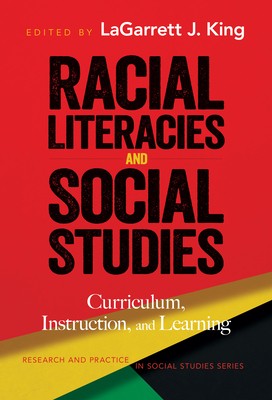
- We will send in 10–14 business days.
- Publisher: Teachers College Press
- ISBN-10: 0807766569
- ISBN-13: 9780807766569
- Format: 15.5 x 22.7 x 1.4 cm, minkšti viršeliai
- Language: English
- SAVE -10% with code: EXTRA
Racial Literacies and Social Studies (e-book) (used book) | bookbook.eu
Reviews
Description
This volume collects the work of historians, researchers, and classroom teachers to define what it means to be a racially literate educator and citizen. History classes should be spaces in which all students learn about their predecessors' legacies as a context for understanding and decision-making in contemporary society. In reality, the historical experiences of people of color are additive at best or marginalized at worst. To address the complexities of teaching and learning about race in the history classroom, chapter authors answer a series of questions related to curriculum, instruction, student learning, and teacher education: (1) how U.S. history narratives and curricular frameworks can or do incorporate the histories of racial/immigrant groups, (2) how teachers in particular contexts enact instruction that promotes and/or impedes students' racial literacy, (3) what students learn or don't learn from race lessons in history, and (4) how teacher educators can educate the next generation of teachers to become racially literate. Readers can use this resource to enable all young people to acquire the knowledge, skills, and dispositions necessary to critique the nation's legacy of racial inequality, as well as understand the historical movements to disrupt inequality.
Book Features:
- Contributes new scholarship on teaching and learning about race, ethnicity, and immigration.
- Draws on empirical studies about the cognitive and affective complexities of teaching about race in ethnically homogenous or heterogeneous K-12 classrooms.
- Shows why the social studies classroom is the educative space to have deep and meaningful experiences in teaching about race and racism.
- Organized in four sections that focus on curriculum, social studies instruction, student learning, and teacher learning.
EXTRA 10 % discount with code: EXTRA
The promotion ends in 21d.07:12:02
The discount code is valid when purchasing from 10 €. Discounts do not stack.
- Publisher: Teachers College Press
- ISBN-10: 0807766569
- ISBN-13: 9780807766569
- Format: 15.5 x 22.7 x 1.4 cm, minkšti viršeliai
- Language: English English
This volume collects the work of historians, researchers, and classroom teachers to define what it means to be a racially literate educator and citizen. History classes should be spaces in which all students learn about their predecessors' legacies as a context for understanding and decision-making in contemporary society. In reality, the historical experiences of people of color are additive at best or marginalized at worst. To address the complexities of teaching and learning about race in the history classroom, chapter authors answer a series of questions related to curriculum, instruction, student learning, and teacher education: (1) how U.S. history narratives and curricular frameworks can or do incorporate the histories of racial/immigrant groups, (2) how teachers in particular contexts enact instruction that promotes and/or impedes students' racial literacy, (3) what students learn or don't learn from race lessons in history, and (4) how teacher educators can educate the next generation of teachers to become racially literate. Readers can use this resource to enable all young people to acquire the knowledge, skills, and dispositions necessary to critique the nation's legacy of racial inequality, as well as understand the historical movements to disrupt inequality.
Book Features:
- Contributes new scholarship on teaching and learning about race, ethnicity, and immigration.
- Draws on empirical studies about the cognitive and affective complexities of teaching about race in ethnically homogenous or heterogeneous K-12 classrooms.
- Shows why the social studies classroom is the educative space to have deep and meaningful experiences in teaching about race and racism.
- Organized in four sections that focus on curriculum, social studies instruction, student learning, and teacher learning.


Reviews